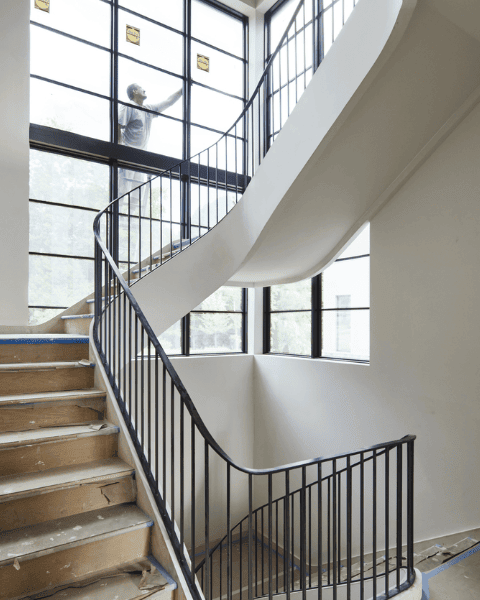Home Renovation Tips: How to Plan Your Remodel
Posted
on September 19, 2023

Are you planning a home renovation project but need help figuring out where to start? Even if you're confident, it's common for a few details to slip through the cracks during the planning stage and pop up to cause problems later.
If you find yourself asking, “Where is the best place to start when renovating a house?” you’ve come to the right place. We’ve compiled this guide of essential home improvement considerations you’ll want to nail down before you begin your next home renovation.
SEE ALSO: 5 REASONS TO INVEST IN A HOME IMPROVEMENT PROJECT THIS YEAR
The Best Place to Start When Renovating a Home
Embarking on a home renovation journey is exciting, yet it can be fraught with unforeseen challenges and complications. When you start a home renovation project, it's crucial to lay a solid foundation of understanding regarding expenses, potential return on investment, and any regulatory requirements you may need to consider ahead of time.
Budget and costs
When considering how to remodel a house, you’ll first want to look at the financial considerations of your home renovation project. This process involves a renovation budget, price comparisons, and determining what value you can gain from your investment. Take the time to research local costs. Dig deep—you don’t want to run out of money halfway through your project because you relied on estimates and assumptions instead of hard facts.
Once you’ve ballparked the costs, use your research to create a goal budget for your project. If you have a budget guiding your project, you’ll know in advance whether you can splurge on extras like upgraded flooring or hardware. Whether you’re starting with your goals first and developing the budget from there or setting a hard cap on expenses and figuring out the limitations of your home renovation under that budgetary restriction, it’s important that you think about money early in the process. Plus, remodeling professionals typically recommend budgeting 10% to 20% extra for unforeseen circumstances.
Licenses, fees and other extra expenses
Depending on local laws, the location of your home, and the nature of the home improvement project you’re undertaking, you may need to consider various fees, licensing costs, and other tertiary expenses. Building permits are essential for home renovation planning because they ensure city inspectors can check your project for potential issues. Check with city officials for information on what permits are necessary for your remodel. Also, consider that many professionals you hire may acquire permits on your behalf. Be sure to check with your contractors and subcontractors, so you know in advance whether permit or licensing fees are part of their negotiated rate.
Cost vs. value
Any home renovation project should be an investment in your home. If it doesn’t promise a return of value equal to or greater than what you’re putting into the project, evaluate whether it’s worth undertaking. This evaluation is an essential home renovation tip that shouldn’t be overlooked. Of course, sometimes value isn’t necessarily tangible—if you want to improve your home for reasons beyond the bottom line value of the real estate, then that’s certainly a value worth considering in your equation. To get a rough idea of cost vs. value for many popular home improvement projects, check out this cost vs. value calculator from Remodeling Magazine.

Timeline for Home Improvement Projects
Mapping out a clear timeline is a cornerstone of successful home renovation planning. As you venture into the world of home improvements, understanding the expected duration of your project and potential hiccups along the way can make the difference between a smooth process and unexpected disruptions.
Estimating a timeline
Creating an estimated timeline for a given home improvement project should be simple. You can determine how long tasks should take with some simple research. From there, choose your start date and build in time for unexpected setbacks and delays. This process is a crucial first step in any step-by-step home renovation checklist to ensure a project starts correctly. Be realistic about the start date—you can’t force materials to arrive early or rush a contractor with a loaded schedule.
Checking for complications
Once you have a rough timeline, ensure everything can run smoothly during the project period. Holidays, periods of intense weather, and vacations taking you out of town will likely compromise your plans. You can schedule around these sorts of events, but it's vital that you think about them in advance instead of being blindsided.


Hiring (and Screening) Professionals
Navigating the intricacies of a home renovation project requires more than just selecting materials or designing layouts. The process requires you to align with the right professionals who can bring your vision to life. With various roles to consider, understanding who to hire and what each brings to the table is essential for success.
Determining who you need
There are two ways to hire professionals to handle a home renovation: hire a general contractor to figure out the details or determine whom you’ll need, then hire subcontractors separately to complete each specific task. The latter may be beneficial and give you more control, but it could also be more complicated. If you opt out of hiring a general contractor, your role as the only renovation planner in the process will take a significant amount of your time.
Types of professionals
Building a successful home renovation team requires expertise and collaboration to ensure each professional's role complements the others. With different professionals offering unique skills, from laying out the vision to executing the design, understanding their strengths can help ensure your project's success. Your dream renovation team will include:
- Contractors. A contractor is in charge of the construction and may also be the person who seeks out and hires subcontractors for specific jobs, like electrical work or plumbing, carpentry like built-in cabinets, or finishing work like painting.
- Architects. If you are changing the layout of your home or moving or removing walls, consulting an architect may be a good idea. An architect can develop plans that ensure your remodel is structurally sound. If you hire a home improvement firm, they may already have an architect on staff to plan the project before any work is done.
- Interior designers. Working with an interior designer can help you determine what you’ll need for your remodel to look polished and complete. An interior designer maximizes your space and ensures the efficient design of rooms. Architects and interior designers often work together to solve space problems and ensure that your home flows smoothly.
Assessing contractors and laborers
Choosing the right professionals for a home renovation project is an entire topic on its own. However, homeowners should consider three main areas when hiring experts:
- Professionalism. Professionals should keep their appointments, communication should be reliable, and results should be consistent.
- Warranties and guarantees. Contractors should stand behind the quality of their work. While the length of warranties and guarantees may vary, you should feel confident knowing the work is high quality.
- References. Honest contractors can offer appropriate references. Ask for references that are similar to the project you are considering.
SEE ALSO: TOP QUESTIONS TO ASK YOUR WINDOW INSTALLER
Do you have any home renovation tips to share or ideas for making home improvement projects go smoothly? Feel free to share in the comments! You can also learn more about home improvement projects by visiting our project page.
Schedule a free consultation to find windows and doors for your home.
